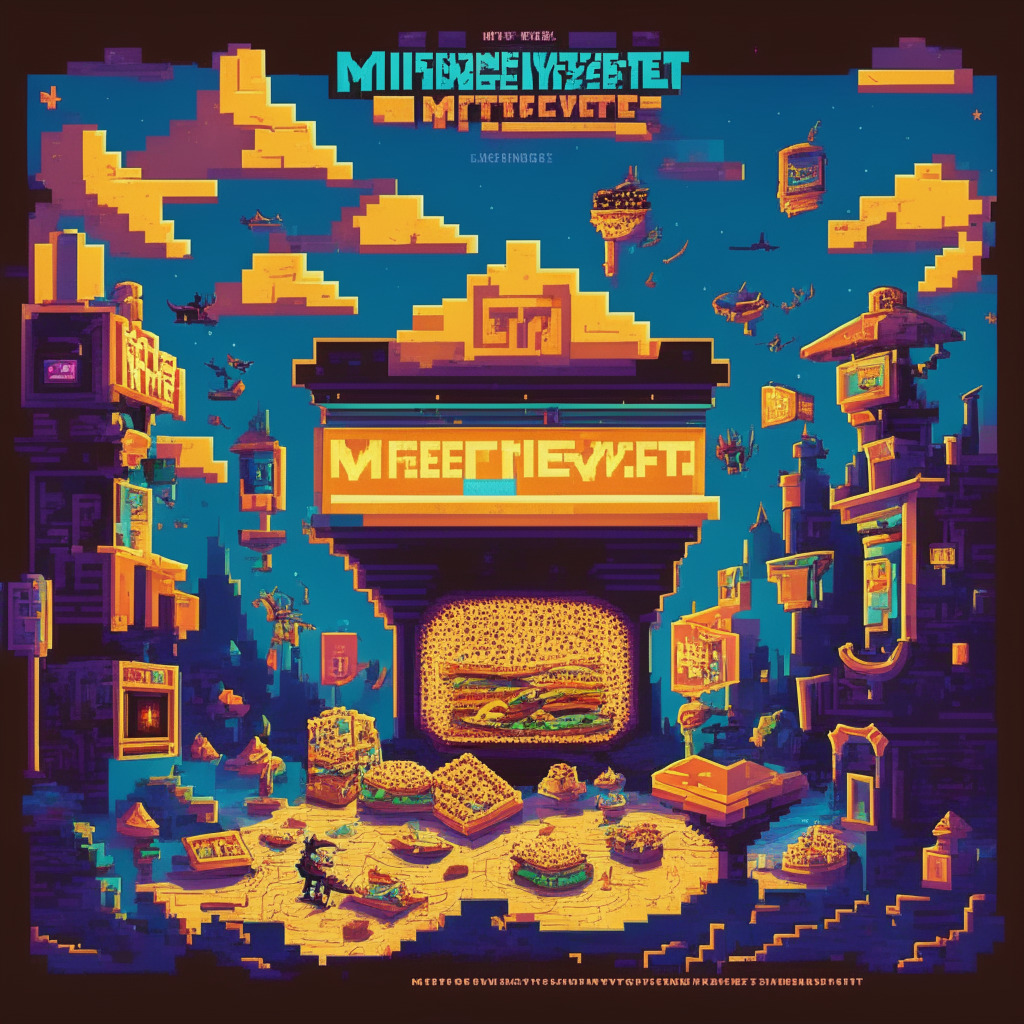‘The Quiet Maid’, the first European feature film funded through NFT sales, represents a new era of blockchain technology in the creative industry. Despite uncertainties surrounding NFTs, this film’s funding model garners worldwide attention. The evolution of blockchain in filmmaking is yet to unfold.
Search Results for: PSC
From Luxurious Lifestyles to Fugitive Status: The Rollercoaster Ride of Three Arrow Capital’s Founders
“Three Arrow Capital, heavily invested in the Terra protocol’s UST stablecoin, faced a significant deficit with the crypto market’s downfall, defaulting on $3.5 billion credit obligations. The subsequent fallout includes the apprehension of the founder, a 4-month prison sentence, and a nine-year investment ban in Singapore.”
Mapping Out the Dynamic Journey through Uptober: Crypto Upsurge or a Temporary Hiatus?
“The onset of October, or “Uptober”, has historically signified increased returns in the crypto market. The US government’s action to avert a shutdown catalyzed this, raising the total market cap to $1.1 trillion. However, volatility and potential situational risks continue to influence these crypto returns.”
Court Overrules SEC’s Dismissal on Bitcoin ETF: A New Dawn for Grayscale or a Risky Bet?
A US federal judge recently overturned the SEC’s dismissal of Grayscale’s proposal to convert its Bitcoin Trust (GBTC) into an ETF, causing ripple effects in the crypto market. Analysts project a 75% likelihood of spot Bitcoin ETF acceptance in 2023. This may lead to substantial consequences for the crypto market, potentially boosting Bitcoin price and possibly paving way for Ethereum’s approval.
Ethereum’s Holesky Testnet Launch Misfires: A Hiccup or Long-Term Concern?
Ethereum’s anticipated test network, Holesky, faced a launch setback due to a misconfiguration, resulting in a two-week delay. Despite being intended to address Ethereum’s scaling issues and allow for increased validators, the event highlighted vulnerabilities. However, the existing Goerli testnet remains functional, supporting continued application testing. This incident does not affect Ethereum’s subsequent hard fork, Dencun.
Navigating the Dilemmas of Animoca Brands’ Mocaverse: Blockchain Innovation or Digital Disparity?
“Animoca Brands has declared a funding round closure for the development of ‘Mocaverse,’ a new platform for online gaming, culture, and entertainment using DAO-based approach. Yet, this promising venture raises concerns over privacy, security, and potential centralization of the decentralized Web3.”
China’s Crypto Clampdown vs Global Leanings: Divergent Paths in Blockchain Evolution
China continues its crackdown on crypto activities on Weibo, targeting more than 80 influential crypto personalities. Meanwhile, the IMF and FSB released policy recommendations to manage cryptocurrency-associated financial risks. In other developments, the DFINITY Foundation partners with Lugano’s municipality and Unstoppable Domains added .eth domain support to its messaging service.
Palau’s Hasty Retreat: Hanged Hopes or Valuable Lesson in Crypto Adoption?
Just a month after launching its U.S. dollar stablecoin, the Pacific nation of Palau has unexpectedly halted the project. The move has sparked curiosity as to why the project, which promised to reduce transaction costs and increase transfer speed for Palau citizens, was abruptly discontinued.
Coinbase’s Step into Crypto Futures Trading: A Myriad of Opportunities and Challenges
“Coinbase recently received approval to offer crypto futures trading, signaling a testament to the durability of the cryptocurrency sector in the US. JMP Securities sees it as a step towards more regulatory clarity and a significant growth opportunity for Coinbase.”
Exploring IQ.wiki: An AI-Powered Crypto Search Engine and Its Challenges
“IQ.wiki has launched a search engine, IQ GPT, powered by OpenAI’s ChatGPT technology that enables users to find answers about cryptocurrencies. The platform integrates artificial intelligence tools to offer accurate, sourced info, and logs each entry on the Polygon blockchain for transparency.”
Crypto Titans Stand to Benefit Most From Blockchain Mining Boom: A Double-edged Sword for Small Fish
“Berstein’s report predicts that large-scale Bitcoin miners stand to make sizable profits, especially with Bitcoin rates around $30,000. Quality investments, surging capacities contributing to 16% of total mined BTC, and growth projections of over 182% position these companies for substantial gains. The resilience of these mining giants could however lead to tougher conditions for smaller miners, potentially forcing them out of business.”
Worldcoin’s Controversial Iris-Scan Tech: Blockchain Innovation or Privacy Nightmare?
“Worldcoin, a crypto protocol that uses iris scans for global identification, has been halted in Kenya due to concerns over data protection. This raises questions on privacy and potential user exploitation in the name of innovation, sparking investigations beyond Kenya’s borders. The crypto community closely watches this as it could define the future of blockchain technology.”
Ripple’s Resilience Amid SEC Trials: Overcoming Adversities in Blockchain Innovation
Despite ongoing legal battles with the U.S. Securities and Exchange Commission, Ripple maintains strong ties with central banks and continues to innovate in the crypto sphere. Their latest venture, a U.S. dollar-pegged stablecoin running on the XRP Ledger, manifests Ripple’s commitment to exploring blockchain potentials.
Palm Foundation’s Move to Polygon Supernet: Innovations in NFT Infrastructure and the Path Ahead
Palm Foundation, with support from Polygon Labs and Consensys, is developing a Polygon Zero Knowledge Supernet to simplify onboarding and expand its NFT infrastructure. The plan includes addressing governance through Decentralized Autonomous Organizations and enhancing transaction speed while maintaining low gas fees. The initiative, targeting broader Web3 user-base, will complete its migration to a ZK Supernet by 2024.
Pacific Paradise or Peril: Palau’s Intriguing Journey into Blockchain and Stablecoins
The Pacific island nation of Palau is testing its own dollar-pegged stablecoin, with considerable assistance from Ripple. The project’s future is contingent upon a report to the nation’s government, deciding if the initiative will be fruitful long-term. Palau is also exploring blockchain technology in digital residency applications and plans to establish its own cryptocurrency exchange.
Navigating the Nostalgia Nugget: McDonald’s Plunge into the Blockchain Metaverse
“In an innovative blend of fast food and blockchain, McDonald’s announced the McNuggets Land in The Sandbox, a metaverse platform. This immersive experience offers treasure hunts and prizes, but faces skepticism about the tangible value of such marketing strategies in a sensory-limited digital realm.”
Ethereum’s New Front-Runner: An In-depth Look at the Power-Packed ERC-1404 Prime
Republic Crypto and Upside have collaborated to create ERC-1404 Prime, an updated version of Ethereum’s ERC-1404 technology. This new standard enhances transfer restriction complexities, preparing tokens for future permutations where decentralized and centralized finance may merge. It aims to align with regulatory expectations and industrial demands, and cultivate assets capable of thriving in uncertain future conditions.
Diving Into Tether’s Asset Management and Stablecoin Backing: New Insights and Unresolved Debates
The article highlights Tether’s funds distribution across multiple institutions and its reliance on commercial paper to back its stablecoin market cap. Documents from the New York Attorney General’s office offer insights into Tether’s asset storage locations, banking relationships, and asset management practices, amid ongoing concerns within the crypto community.
DeFi Dad’s Journey to Crypto Fame: Ethical Content and Ethereum’s Future Potential
Travis Blane, aka “DeFi Dad,” discusses his journey in the crypto world and his commitment to maintaining ethical standards in content creation. Enthusiastic about Ethereum, Blane believes it’s undervalued, with Ether potentially reaching $20,000-$30,000. He encourages focusing on the bright future of decentralized finance technologies.
MicroStrategy’s BTC Wallet and Lightning Adoption: Game Changer or Overhyped Solution?
MicroStrategy plans to introduce a Bitcoin wallet and Lightning address for corporate account holders, aiming to facilitate efficient development and deployment of bitcoin rewards applications. The Lightning Network, seen as a game-changer, is expected to drive Bitcoin mainstream adoption. As more fintech firms embrace cryptocurrencies, MicroStrategy’s move could significantly upscale BTC adoption.
Blockchain’s Future: Balancing Optimism, Skepticism, and Sustainability in a Digital World
Blockchain technology brings transparency, security, and efficiency to various sectors but faces challenges like immense energy requirements and market volatility. Emerging technologies and growing institutional interest may aid in addressing these concerns, but the future of blockchain depends on honest discussions and global collaboration.
EY’s Ethereum Platform for Carbon Tracking: Boon for ESG or Risky Business?
Ernst & Young’s Ethereum-based platform, EY OpsChain ESG, enables enterprises to track carbon emissions and credit traceability, offering transparency and detailed traceability through tokenization. Aligning with InterWork Alliance standards, the platform aims to improve Environmental, Social, and Governance (ESG) decision-making and promote a sustainable future, albeit with potential limitations in data validation and tokenization accuracy.
EY’s Ethereum Platform for Carbon Tracking: The Pros, Cons, and Future Implications
EY unveils an Ethereum-based platform, EY OpsChain ESG, aimed at tracking carbon emissions and carbon credit traceability for enterprises. The platform emphasizes sustainability and environmental, social, and governance measures, leveraging tokenized emissions inventory to enable transparency and progress measurement. However, blockchain’s energy-intensive nature and reliance on carbon credit tokens invite criticism and warrant careful analysis.




















